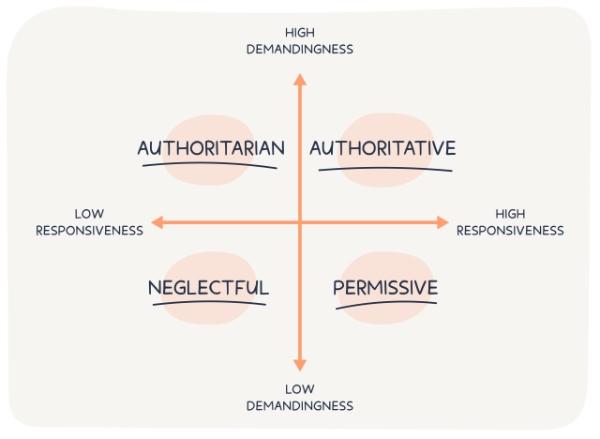Parenting is an important aspect of a child’s life. It determines how a child behaves, how confident they are, and how they look at things in the future. The manner in which you nurture your child normally forms the basis of their personality and values. This is why it is so necessary to know your parenting style. If you understand your parenting style, you can contribute better to your child’s upbringing.
Today, one parenting style that has gained attention is permissive parenting. A lot of modern families are tilted towards this style. In this blog, we will take a more specific look at permissive parenting-what exactly it is, why it is so prevalent, and how it has long-term consequences for children.
Definition of permissive parenting
Parents who follow a permissive parenting style are very loving, warm, and fulfill all the demands of their kids within their reach. And they rarely expect their children to return the same level of responsibility or accountability. They do not set any rules or boundaries for their kids. They treat them like their friends. Parents tend to avoid conflict. They believe that children learn things with natural consequences. So, the permissive parenting style is a lenient way of parenting.
If we talk about the origin of permissive parenting, the concept of this parenting came into the picture in recent history. Dr. Benjamin Spock, a renowned parenting expert, wrote The Common Sense Book of Baby and Child Care in 1946, which became widely popular in the late 1950s and 1960s. In his book, he just compared less rigid and loving parenting to strict parenting.
Later, in the 1960s, Dr. Diana Baumrind, a developmental psychologist, conducted research on parenting practices and their effects on children’s behavior. There, she observed parenting patterns and family behaviors. From her studies, she proposed three different parenting styles (later expanded to four by other researchers). Authoritative parenting, authoritarian parenting, permissive parenting, and uninvolved parenting.
Let’s have a quick look at these four parenting styles so that you can understand permissive parenting better:
- Authoritarian parenting: This parenting style is characterized by strict rules and expectations. Parents set clear boundaries and rules. They have high demands from their kids and low responsiveness.
- Authoritative parenting: This parenting style also sets clear boundaries and rules for their kids. However, this style also provides support and fosters good communication with kids. You can say it’s a balanced approach of high expectations with warmth and care.
- Uninvolved parenting: In this type of parenting, children do not receive proper emotional support and guidance from their parents. Parents are detached from their kids’ lives. Parents show no interest in setting boundaries or don’t expect anything from their kids.
- Permissive parenting: As we already read in the write-up, this style is a very lenient way to raise kids. Parents do not have any expectations of their children, but they provide them with all the emotional and financial support they need.
Key characteristics of permissive parents



Parents who follow permissive parenting typically exhibit some common traits in their behavior and approach to raising children. These traits include:
1. Lack of strict rules
Permissive parents often avoid making or enforcing strict rules. You can understand it better with an example, like a child may stay up late, eat sweets before dinner, or spend long hours on screens without restrictions.
2. High emotional warmth
These parents are very affectionate and nurturing. They ensure that their children receive love and support at all times. They talk to their kids whenever their kids need it.
3. Avoidance of conflict
Instead of telling their children “no” or disciplining them, lenient parents may agree to avoid arguments. They may let their children do as they please to keep the peace.
4. Open communication
Children of liberal parents can discuss their feelings and ideas openly. Parents listen attentively and rarely criticize.
5. Low expectations of maturity
Permissive parents do not expect their children to take on responsibilities that are appropriate for their age. For example, they may not ask a teen to help them with housework or manage any other responsibility.
6. Focus on happiness
These parents often believe that keeping their child happy is more important than setting rules or limits.
7. Lenient discipline
If there is discipline, it is usually mild or irregular. Parents may warn children, but rarely follow through on consequences.
Permissive parenting while ensuring children’s online safety
The impact of a permissive parenting style on children
The effects of permissive parenting can be both positive and negative. Here are both the positive and negative effects below:
Positive effects
- High self-esteem: Children who grow up with permissive parenting often feel valued and supported. They know that their parents love them unconditionally, which makes them more confident.
- Strong communication skills: In permissive parenting, parents listen to their kids openly, and due to this, kids express their thoughts and feelings clearly.
- Creative thinking and self-direction: Children with a permissive parenting style can think out of the box. They possess a positive mindset, taking risks and finding creative solutions to problems.
- Warm relationship with parents: A friendly relationship between parent and child promotes trust and emotional closeness.
Negative effects
- Poor self-control: Without rules, children may have difficulty controlling their tendencies, such as overspending, overeating, or abusing technology.
- Problem obeying rules: Kids raised with permissive parenting often have high self-esteem. Due to this attitude, they face problems with discipline and respecting rules.
- Difficulty keeping up in school: Children with a permissive parenting style may perform poorly in school. This is because children grow up lacking discipline and responsibility.
- May face more behavior issues: Children may display aggressive or disobedient behavior because they are not used to hearing “no.”
- Low resilience: When children are shielded from rules and responsibilities, they may find it harder to face challenges later in life.
- Over-dependence: Despite appearing independent, some children raised under permissive parenting become overly reliant on their parents for decision-making because they lack experience with limits.
- Health issues: Because of this kind of parenting style, children easily adopt wrong eating habits, especially eating snacks. This makes children obese.
So, a child may grow up in a home where bedtimes are flexible and there are no restrictions on screen use. They may be happy for a short time, but as they grow older, they may face sleep problems, lack of attention, and poor academic performance.
This shows how permissive parenting has both short-term benefits and long-term risks.
FAQs
This is neither entirely good nor entirely bad. This is because permissive parenting provides love, emotional security, and freedom, which are essential for a child’s development. However, when rules and regulations are absent, children may lack self-discipline, responsibility, and respect for authority. So the balance of both is always better.
Both styles show love and warmth, but authoritative parents also set clear rules and expectations. In permissive parenting, rules are few and discipline is rare. In authoritative parenting, children enjoy freedom within boundaries, which helps them develop both independence and responsibility.
Children from permissive parenting often have high self-confidence, creativity, and good communication skills. At the same time, they may have problems with discipline, academic performance, and following rules. Some children may also have difficulty with emotional control or behave impulsively.
Strategies for transitioning from permissive parenting
Parents who use permissive parenting but want to create a healthier balance can take practical steps to improve their style. Here are some strategies:
Set clear rules
Start with simple, age-appropriate rules. For example, set a bedtime, limit screen use, or assign small household tasks.
Be consistent with discipline
If a rule is broken, there are consequences. Teach your children well about its consequences. This can make your children responsible.
Encourage independence with limits
Give children choices, but within limits. For example, let them choose between some snacks rather than unlimited choices.
Praise effort, not just outcomes
When children show responsibility or respect for the rules, encourage them. This can develop positive behavior in children.
Model responsible behavior
Children learn by watching. Show them how you manage responsibilities, time, and emotions.
Balance freedom with accountability
Let children enjoy freedom, but make sure they understand that choices have consequences.
Open communication with structure
Keep listening to your children, but explain why the rules are there. For example, say, “I care about your health, so going to sleep at the right time is important.”
Use digital tools for healthy habits
Nowadays, technology has become an important part of children’s lives. Children spend most of their time scrolling on their phones. This can lead to children developing an unhealthy habit of being on the phone. Also, there are many things online that are not good for children, such as inappropriate content, abusive language, violence, fraud, etc. But need not worry! Parents can protect their children from these dangers and give them healthy habits with the FlashGet Kids app. Here are some useful features of it:



- You can set daily screen time limits to prevent overuse
- This app gives you control to block unsafe or inappropriate apps and websites
- You can track your child’s location for safety and peace of mind
- On this app, you can schedule your kids’ study time and rest time to build healthy routines
- This app gives instant alerts if your child faces online risks
Last word
The key to good parenting is balance. You can create this balance with love and care, but it’s also important to guide your kids in the right direction. Setting boundaries, keeping some rules, and using tools like the FlashGet Kids app can help you develop good habits in your kids. This will make your kid both happy and responsible.
At the end of the day, every parent wants the best for their child. Understanding permissive parenting gives you the power to decide if this approach works for you or if a more balanced style will help your child grow into a confident, responsible, and successful adult.

